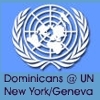

| BRIEFING - June 26, 2013 | To learn more about the Millenium Development Goals, click on the graphic Read the winter issue of the Dominicans at the UN newsletter Past Briefings: June 12, 2013 May 8, 2013 April 24, 2013 February 27, 2013 February 13, 2013 January 30, 2013 December 19, 2012 December 5, 2012 November 16, 2012 October 17, 2012 September 26, 2012 September 12, 2012 August 29, 2012 July 11, 2012 |
|
RIO + 20 one year later… Where are we? One year ago at RIO + 20, the UN Conference on Sustainable Development in Rio de Janeiro, UN Member States decided to launch a process to develop a set of Sustainable Development Goals (SDGs), which would build upon the Millennium Development Goals and converge with the post-2015 development agenda. Rio + 20 did not elaborate specific goals, but stated that these goals should be limited in number, easy to communicate, and that they should address in an integrated fashion the three essential dimensions of sustainable development – social, environmental and economic. A 30-member Open Working Group has been established to prepare a proposal on these Sustainable Development Goals. The Open Working group has had four sessions thus far. Among the themes addressed were poverty eradication and sustainable development; food security and nutrition; sustainable agriculture, desertification, land degradation and drought; water and sanitation; employment and decent work; social protection; education and culture; health and population dynamics. At these sessions, Member States submit statements on the particular topics being addressed. Let me give you an example. This is an excerpt from His Excellency, Mr. Robert Aisi, the Ambassador of Papua New Guinea, speaking on behalf of the Pacific Small Island Developing States (PSIDS). This cluster includes the tiny island nations of Nauru, Palau, Fiji, Marshall Islands, Micronesia, Samoa, Solomon Islands, Tonga, Tuvalu and Vanuatu. Many of us have probably never heard of some of these places; and they are barely discernible on the map. However, as the Earth’s atmosphere continues to warm, and global climate patterns continue to change, these tiny islands are the ones who will suffer irreversible damage. Here, in part, is Mr. Aisi’s statement:
Besides Member States, representatives from the nine Major Groups also submit statements. The plan of action established at the 1992 Rio Earth Summit, entitled “Agenda 21,” called for nine Major Groups, designated to represent civil society’s concerns in the ongoing evolution of a sustainable development agenda. These groups are: business and industry; children and youth; farmers; Indigenous Peoples; local authorities; NGOs; scientific and technological community; women; workers, and trade unions. If you follow the links, you will be able to read two interventions made at the Open Working group sessions: one made by the Mining Working Group at the UN—which represents a coalition of NGOs challenging the unsustainable practices of the mining industry—and another by the NGO Sub-Committee for Poverty Eradication, addressing the issues of food security and climate change. It is ultimately the task of the Open Working Group to synthesize all the input into a manageable set of Sustainable Development Goals—goals that are people-centered, and planet-sensitive. More on this future briefings…
|
Dominican Leadership Conference
Building relationships and collaborating in the mission of preaching the Gospel
29000 West Eleven Mile Road
Farmington Hills MI 48336
248-536-3234 Contact: Executive Director

